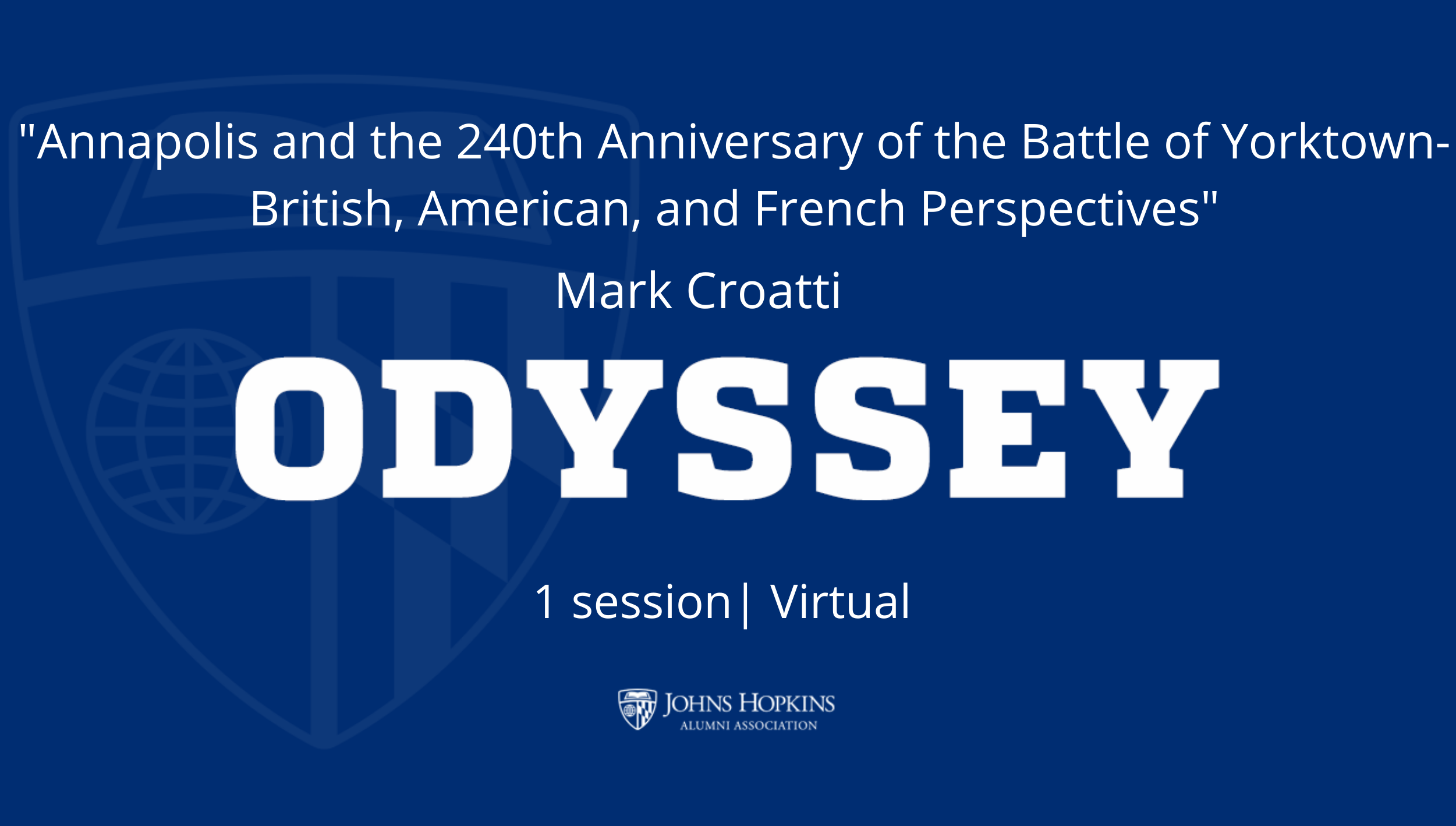*NOW A Virtual Event*| "Annapolis and the 240th Anniversary of the Battle of Yorktown- British, American, and French Perspectives"

Brought to you by Odyssey
October 30, 2021
Saturday, 9:00 AM ET (3 course hours)
Want to feel like a midshipman for a day? “Mini Academy” is back! On October 19, 1781, British General Charles Cornwallis surrendered to General George Washington, Commander-in-Chief of the United States Continental Army, effectively ending the military portion of the Revolutionary War, although limited hostilities would continue as the political path to American independence took almost three additional years. Annapolis played a prominent role in many key events both preceding and following the Battle of Yorktown as an emerging nation struggled to meet the obligations of the subsequent Treaty of Paris. The city served as the first peacetime capital of the United States, where Congress accepted George Washington’s resignation as Commander-in-Chief of the Continental Army and ratified the Treaty of Paris. Congress also made two crucial appointments: Thomas Jefferson as a trade minister to France and John Jay as Secretary of Foreign Affairs. Join us to analyze the historical significance of the Battle of Yorktown and its aftermath, including how Annapolis connected the Revolution to the Constitution.
9:00 -10:30 a.m. Session 1: The Siege of Yorktown
This battle was a critical turning point in the Revolution; it convinced the British it was impossible to retain the American colonies through war. In October 1781, combined French and American forces under General George Washington and the Comte de Rochambeau surrounded a British army led by Lord Cornwallis, leading to the surrender of over 7,000 soldiers, a major part of a much larger campaign that carried the war as far afield as the West Indies and the English Channel as well as closer to home. Annapolis served as a crucial staging post for French soldiers camped on the grounds of St. John's College and was thus an important component of the defeat of the British Empire in America. Matthew Dziennik, PhD, University of Edinburgh, is an Associate Professor of British and British Imperial History in the Department of History at the United States Naval Academy in Annapolis and is the author of The Fatal Land: War, Empire, and the Highland Soldier in British America (New Haven: Yale University Press, 2015). He previously served as a guide at the National Colonial Battlefield Park in Yorktown and is currently working on a book about military recruitment in the British Empire.
10:45 a.m. -12:15 pm - Session 2: The Treaty of Paris
Almost two years after the Siege of Yorktown, the Treaty of Paris was signed on September 3, 1783. Many believe this treaty simply ended the war, and it did, but it also kicked off a difficult and violent four-year period often overlooked in the history books, where a broke Congress could not meet its domestic or international financial obligations as mandated by the treaty. After multiple but ultimately futile attempts to overcome seemingly insurmountable obstacles, a key meeting in Annapolis that met as Shays’ Rebellion was underway convinced many key founders that the Articles of Confederation must be replaced with an entirely new Constitution. Annapolis as a city—and Maryland as a state—were center stage as the United States struggled to meet its responsibilities as a newly sovereign nation. Mark Croatti, MA, University of Southern California, is an Adjunct Professor in the Department of Political Science at the United States Naval Academy in Annapolis, teaching courses on the U.S. Constitution, Comparative Politics, and International Relations.
About the Instructors

Mark Croatti, MA, University of Southern California, is an Adjunct Professor in the Department of Political Science at the United States Naval Academy in Annapolis, teaching courses on the U.S. Constitution, Comparative Politics, and International Relations.

Matthew Dziennik, PhD, University of Edinburgh, is an Associate Professor of British and British Imperial History in the Department of History at the United States Naval Academy in Annapolis and is the author of The Fatal Land: War, Empire, and the Highland Soldier in British America (New Haven: Yale University Press, 2015). He previously served as a guide at the National Colonial Battlefield Park in Yorktown and is currently working on a book about military recruitment in the British Empire.
Tuition Remission and Refund Policies
Full-time JHU faculty/staff, their spouses or same-sex domestic partners, JHU retirees and their spouses or same-sex domestic partners are eligible for tuition remission. The tuition remission form is required. All tuition remission forms and details on eligibility can be found here and should be returned to odyssey@jhu.edu.
After registration, tuition remission eligibility will be confirmed by the Odyssey registrar. If eligibility cannot be confirmed, you will be required to pay full tuition for the course. Under the terms of the University’s remission program, Hopkins employees must withdraw in writing at least five working days before the first class to receive a 100% refund. No partial refunds are given to JHU employees and affiliates.
Please visit the registration and policies page for more information.
While participating in on-campus events and meetings, participants must follow all public health guidelines required by Johns Hopkins University and Medicine at the time of the event. If you are not fully vaccinated, we require that you wear a face covering during your visit to campus, even when it is no longer required for those who are vaccinated.
While participating in off-campus events and meetings sponsored by the JHAA/JHM/JHHS participants must follow all public health guidelines mandated by the local jurisdiction and venue at the time of the event, including vaccination and masking and distancing guidance. Johns Hopkins strongly suggests that attendees who join in person be fully vaccinated.
